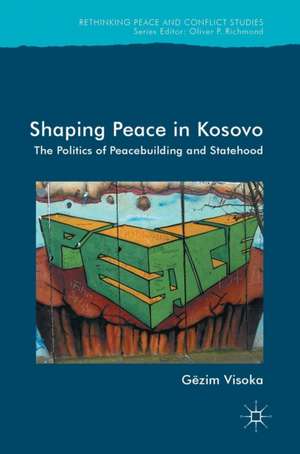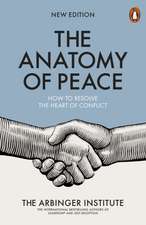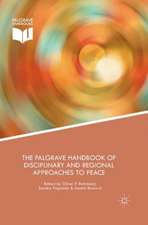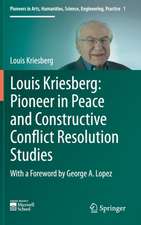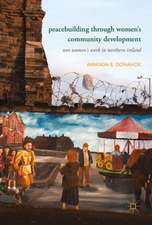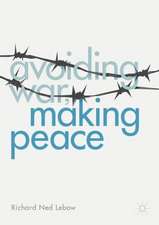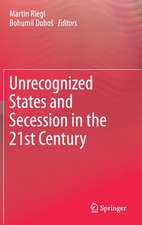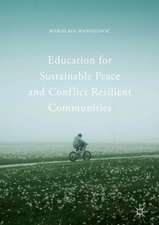Shaping Peace in Kosovo: The Politics of Peacebuilding and Statehood: Rethinking Peace and Conflict Studies
Autor Gëzim Visokaen Limba Engleză Hardback – 18 apr 2017
| Toate formatele și edițiile | Preț | Express |
|---|---|---|
| Paperback (1) | 524.55 lei 6-8 săpt. | |
| Springer International Publishing – 18 iul 2018 | 524.55 lei 6-8 săpt. | |
| Hardback (1) | 699.12 lei 6-8 săpt. | |
| Springer International Publishing – 18 apr 2017 | 699.12 lei 6-8 săpt. |
Din seria Rethinking Peace and Conflict Studies
-
 Preț: 318.69 lei
Preț: 318.69 lei -
 Preț: 358.55 lei
Preț: 358.55 lei - 20%
 Preț: 565.33 lei
Preț: 565.33 lei -
 Preț: 453.98 lei
Preț: 453.98 lei - 15%
 Preț: 646.62 lei
Preț: 646.62 lei -
 Preț: 113.01 lei
Preț: 113.01 lei -
 Preț: 272.92 lei
Preț: 272.92 lei -
 Preț: 426.56 lei
Preț: 426.56 lei -
 Preț: 392.60 lei
Preț: 392.60 lei - 15%
 Preț: 699.93 lei
Preț: 699.93 lei -
 Preț: 386.99 lei
Preț: 386.99 lei -
 Preț: 386.39 lei
Preț: 386.39 lei -
 Preț: 389.88 lei
Preț: 389.88 lei -
 Preț: 389.88 lei
Preț: 389.88 lei -
 Preț: 389.11 lei
Preț: 389.11 lei -
 Preț: 390.63 lei
Preț: 390.63 lei - 15%
 Preț: 639.25 lei
Preț: 639.25 lei -
 Preț: 389.49 lei
Preț: 389.49 lei - 18%
 Preț: 783.25 lei
Preț: 783.25 lei -
 Preț: 388.72 lei
Preț: 388.72 lei -
 Preț: 388.72 lei
Preț: 388.72 lei -
 Preț: 392.60 lei
Preț: 392.60 lei -
 Preț: 390.63 lei
Preț: 390.63 lei -
 Preț: 390.63 lei
Preț: 390.63 lei -
 Preț: 390.63 lei
Preț: 390.63 lei -
 Preț: 390.63 lei
Preț: 390.63 lei - 15%
 Preț: 644.95 lei
Preț: 644.95 lei -
 Preț: 387.20 lei
Preț: 387.20 lei -
 Preț: 384.86 lei
Preț: 384.86 lei -
 Preț: 392.21 lei
Preț: 392.21 lei - 15%
 Preț: 574.77 lei
Preț: 574.77 lei - 15%
 Preț: 699.45 lei
Preț: 699.45 lei -
 Preț: 387.58 lei
Preț: 387.58 lei -
 Preț: 390.63 lei
Preț: 390.63 lei -
 Preț: 417.14 lei
Preț: 417.14 lei -
 Preț: 388.72 lei
Preț: 388.72 lei - 15%
 Preț: 644.30 lei
Preț: 644.30 lei -
 Preț: 384.09 lei
Preț: 384.09 lei -
 Preț: 388.72 lei
Preț: 388.72 lei -
 Preț: 401.24 lei
Preț: 401.24 lei -
 Preț: 388.52 lei
Preț: 388.52 lei -
 Preț: 388.72 lei
Preț: 388.72 lei
Preț: 699.12 lei
Preț vechi: 822.50 lei
-15% Nou
Puncte Express: 1049
Preț estimativ în valută:
133.79€ • 139.17$ • 110.45£
133.79€ • 139.17$ • 110.45£
Carte tipărită la comandă
Livrare economică 15-29 aprilie
Preluare comenzi: 021 569.72.76
Specificații
ISBN-13: 9783319510002
ISBN-10: 3319510002
Pagini: 264
Ilustrații: XI, 264 p.
Dimensiuni: 148 x 210 x 18 mm
Greutate: 0.48 kg
Ediția:1st ed. 2017
Editura: Springer International Publishing
Colecția Palgrave Macmillan
Seria Rethinking Peace and Conflict Studies
Locul publicării:Cham, Switzerland
ISBN-10: 3319510002
Pagini: 264
Ilustrații: XI, 264 p.
Dimensiuni: 148 x 210 x 18 mm
Greutate: 0.48 kg
Ediția:1st ed. 2017
Editura: Springer International Publishing
Colecția Palgrave Macmillan
Seria Rethinking Peace and Conflict Studies
Locul publicării:Cham, Switzerland
Cuprins
1: Intervention, Peace and the State.- 2: Fluid Interventionism and the Politics of Peacebuilding.- 3: The Politics of Statehood and the Ungovernability of Peace.- 4: Local Resistance and the Politics of Self-Determination.- 5: Civil Society and Peace Formation.- 6: Peace as Normalisation.- 7: The Quest for an Emancipatory Peace.
Notă biografică
Gëzim Visoka is Lecturer in Peace and Conflict Studies at the Institute for International Conflict Resolution and Reconstruction at Dublin City University, Ireland.
Textul de pe ultima copertă
“This book illuminates the international attempts to build peace amidst a history of ethic confrontation and the clash of demands for self-determination with the doctrine of territorial unity of states. It offers an innovative theoretical framework for the study of international peacebuilding while applying it to a masterful analysis of the case of Kosovo.”
Marc Weller, Professor of International Law and International Constitutional Studies, University of Cambridge, UK.
“Kosovo was the poster child of international intervention. It was a ‘good war’ against tyrannical dictatorship and afterwards was lavished with international peacebuilding assistance. Fifteen years on, Gëzim Visoka unpacks the story of precarious peacebuilding in Kosovo. This incisive and timely analysis is theoretically and conceptually innovative, and punctures the myth of peacebuilding ‘strategy’. Visoka explores the fluid and unfinished nature of peacebuilding, and contends that bottom-up community initiatives have the capacity to change on the ground conditions. This book is a rapier-like critique of failed peacebuilding and will be on my reading lists.”
Roger Mac Ginty, Professor of Peace and Conflict Studies, University of Manchester, UK.
Marc Weller, Professor of International Law and International Constitutional Studies, University of Cambridge, UK.
“Kosovo was the poster child of international intervention. It was a ‘good war’ against tyrannical dictatorship and afterwards was lavished with international peacebuilding assistance. Fifteen years on, Gëzim Visoka unpacks the story of precarious peacebuilding in Kosovo. This incisive and timely analysis is theoretically and conceptually innovative, and punctures the myth of peacebuilding ‘strategy’. Visoka explores the fluid and unfinished nature of peacebuilding, and contends that bottom-up community initiatives have the capacity to change on the ground conditions. This book is a rapier-like critique of failed peacebuilding and will be on my reading lists.”
Roger Mac Ginty, Professor of Peace and Conflict Studies, University of Manchester, UK.
This book explores the prospects and limits of international intervention in building peace and creating a new state in an ethnically divided society and fragmented international order. The book offers a critical account of the international missions in Kosovo and traces the effectiveness of fluid forms of interventionism. It also explores the co-optation of peace by ethno-nationalist groups and explores how their contradictory perception of peace produced an ungovernable peace, which has been manifested with intractable ethnic antagonisms, state capture, and ignorance of the root causes, drivers, and consequences of the conflict. Under these conditions, prospects for emancipatory peace have not come from external actors, ethno-nationalist elite, and critical resistance movements, but from local and everyday acts of peace formation and agnostic forms for reconciliation. The book proposes an emancipatory agenda for peace in Kosovo embedded on post-ethnic politics and joint commitments to peace, a comprehensive agenda for reconciliation, people-centred security, and peace-enabling external assistance.
Caracteristici
Provides first local critical perspective of peacebuilding and statebuilding in post-conflict Kosovo Offers a timely and vivid critique of international fluid interventionism and externally-imposed policies of peacebuilding and statebuilding Offers a viable agenda for an emancipatory peace in Kosovo
